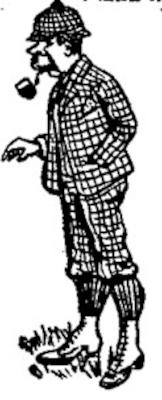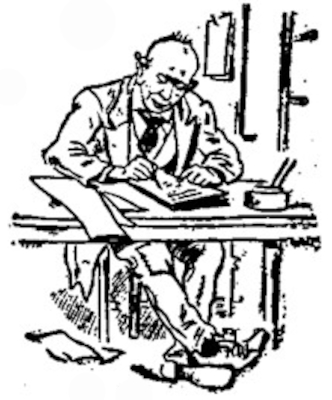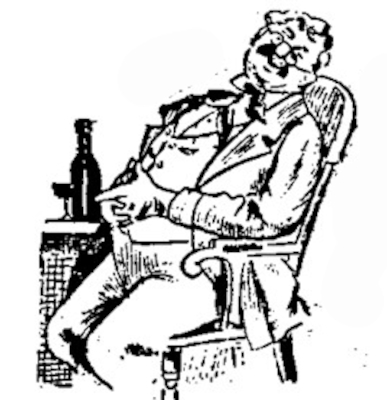This article has been transcribed from a copy of the Cardiff Times in the online collection of scanned Welsh newspapers 1804-1919 in the National Library of Wales, with grateful recognition of the free access accorded to all readers. Paragraph breaks have been introduced for easier reading.
This article requires no explanation. The dialect is all from Yorkshire. The line ‘linked dulness long drawn out’ is a misquotation from Milton’s ‘L’Allegro’ (l. 140): ‘lincked sweetnes long drawn out’. In Dickens’s Dombey and Son (1846-48), Joseph Bagstock is a conceited, retired army officer, one of whose characteristics is always to refer to himself in the third person as ‘Josh Bagstock’. Nestor, King of Pylos, was the wise but loquacious adviser to the Greeks during the Trojan War. In the newspaper office, Stickphast Paste was the standard, vegetable-based office paste, and ‘copy’ paper was paper on which ‘copy’ was typed for the press. —David Skilton

The woman’s rights bore.
Y dear sir, I am one of those beings who always find it difficult to stave off the too pressing attentions of ill-advised friends and acquaintances – I have, in fact, sir, many attributes of weak-mindedness in regard to my demeanour in the social sphere in which I mix. Thus it is, perhaps, that l am chosen by certain pastmasters in the art of boredom as the special subject of their verbally penetrative operations. If any man of my intimate acquaintance gets into any sort of a scrape, I am pretty sure to be consulted in the matter, and as my advice is invariably disregarded, my friends usually come out of their difficulties with flying colours. It may be that I am consulted on that account – consulted in fact, because I was never known to work myself out of any scrape of my own without being a severe sufferer. I am the victim, sir, of men who have been badly used by someone or another and who tell me ‘how it all happened.[’]
My wearied ears are assailed (when I take a bit of a stroll as a relaxation from the efforts of literary composition) by men who insist upon telling me the plot of a play they have incubated; if I seek the buffet of a theatre when the play wearies and the plot becomes tortuous and even torturing, I am certain to meet some aspiring amateur novelist (one who has never had any work published, thank goodness) who gives me a full, true, and particular account of the incidents in his latest ‘effort’ (these filings are always ‘efforts’ in the mouths of amateurs) – yea, even up to the last dying speech and confession of the villain. When I am in a hurry to catch a train which is to bear me on important business to some distant town, you may bet odds on it that I meet with a would-be funny man who wants to tell me ‘that awfully good thing, you know, that happened at Capfitt’s the other night.’ He (the funny man) begins. ‘Well, it was in this way, you know,’ and I writhe beneath his eye, for I see that he has me on toast. With a groan of agony do I hear the train whistle and leave the station it is of no use, I must hear the story out, so absurd is my sense of politeness (I am modest, you see, sir) in such matters. And this terrible reiteration and multiplication of stories and complaints to be poured into my ear [are] not indulged in alone by those I am wont to regard as my friends. All sorts of people who have no claim whatever upon my consideration seek my misdirecting aid, and to them I am evidently a veritable Nestor. The charwoman asks me how she is to avoid being ‘done out of her rights,’ the servant girl's sister asks me would I ‘write a bit of paper for her,’ a groom from the neighbouring mews comes and asks me how far it is to Seringapatam, or somewhere or other, as ‘he has a bit of bet on,’ &c.; other people ask me could I ‘mik' a bit o' interest wi' so and so for them’ – I am a perfect martyr, sir, I am indeed.

The bore who has shot more game than any man breathing.
Turn where I will, someone has a ‘bit o' something in my way’ (very much in my way, obstructively considered) to tell me – some musty old chestnut that I had thought buried for ever in an unhallowed grave, and even persons to whom I am first introduced ‘have something awfully good’ to relate to me, and I am obliged to smile in a horribly ghastly fashion as they pour forth their ‘linked dulness long drawn out’ into my maddened hearing. I would match that smile of mine for stereotyped hardness and agony with that of any ballet girl who ever obtained octogenarian honours. Men who have had quarrels with their mothers-in-law want to know what ‘I would do under the circumstances,’ and if by any chance they should follow my counsel, well — they generally regret it, that's all, and regard me as a bitter enemy from that time forth. Men who have received summonses (and, of course, have never done anything to deserve them) women who are determined to have the law on their husbands (‘he's aht drinkin' all t'day with low lived pigs, sir, an' t'childer hesh't a shoe ta ther fooit; all t'neighbours cry sha-a-me on him’) expect me to endorse the sentiment which dictates their action; aspiring tradesmen who think that they can get a good advertisement for nothing have something ‘novel’ to show me, something which will interest a person of my ‘great intelligence’ (‘tha knaws’), and which might be worked into one of those ‘awf'ly good things I put into the papers’ — but I'm rather too old for them, sir; like ‘[“]Joe” Bagstock, the celebrated J.B., sir, Joe B., sir, Joe,’[i] I am ‘devilish sly.’

The literary man who is one of the great victims of bores.
Young men, sir, very young men indeed, occasionally have the monstrous impudence to call on me in order that I may give an opinion upon their poems — they never call again, sir, I draw the line of martyrdom at them. I will not tell you how I receive them: that is one of the mysteries of my sanctum. Perhaps it is with a patent Gatling gun that showers stinging peas upon them on their backs — never mind, they never call again, and they never tell anybody that they have called, and when my name is mentioned they shudder and order something hot and comforting in order to drown the recollection of their meeting with me.

The good old charlatan bore who calls for subscriptions.
The bore who is most to be condemned, sir, in the social circle is the person of ‘private means,’ as it is called. Why or earth he can't, having nothing else to do, keep himself to himself, or find a companion of his own kidney and decently drink himself to death, I really don’t know. But what he does is to call upon persons like myself during the best working hours of the day, and probably when you are, with the perspiration of work and intense worry on your brow, toiling against time, which is a very bad thing to do even under the most favourable conditions. He plants himself down in your easiest chair, lights a big and elaborate pipe, remarks that you ‘writing chaps’ have a rare easy time of it, and that he thought you would like a bit of company maybe (maybe, indeed!), and he then quite resignedly, as you take little notice of him and go on grinding away at your work, asks you ‘what you are making faces at.’ Perhaps you have never noticed, sir, that many literary men and the majority of artists (especially ‘comic’ artists) make faces as they work, The passion they are describing at the moment finds expression in their own faces, and that is a fact whether you have noticed it or not. Well, sir, under such circumstances it is rather hard to be told that you are ‘making faces.’ I made faces in good earnest at one man lately, sir. When he planted himself down, began to fill his pipe, and said that he had often thought he'd begin to write himself, as he felt quite sure he would make a bit, I deftly and slyly dipped my forefinger in the red ink, scored my face down from each side of the bridge of my nose with the crimson fluid, thrust two quill pens into my shock head of hair. stuck with the ‘Stickphast’ brush a piece of ‘copy’ paper on my chin, and then opening my mouth very widely so as to show my remaining two front teeth, I glanced at and confronted him, never speaking a word the whole time. With a pair of scissors in one hand and a ruler in the other, I approached him a la the demons of Pantomime. He seemed surprised at first, dropped his pipe, and half rising. said, Wha -- wha -- what is it, S-S-S-Samuel?'' ‘Chick-er-booker bacca box,’ hissed I, grinding my teeth. ‘Ha-ha-ha, have you been d-d-drinking, Samuel?’ he said, but at this, sir, I gave a howl that would have done credit to an Apache on the war path and made for him.

The bore who has made his fortune, don’t you see, and lets you know it.
He was out of the house in a tick-tack, sir, and I saw him pause about three hundred yards up on the street, where he sat down, panting, on the coping by some railings, mopping his hatless brow the while. The worst of it is, sir, that he set it about everywhere that he found me with seven empty spirit bottles by my side, that I told him I was Mumbo-Jumbo, that I had tattooed myself, and that I attempted to cut his throat with a piece of a broken window pane. Drat it, who is that ringing at the bell, I wonder! All right -- very well -- quite so, I recognise the voice, it is Prosyman coming to tell me of his brother's treatment of him. Where are my feathers? Where is my red ink pot? Now for the festive gumbrush! All right, let him approach, that's all.
Last modified 24 February 2022